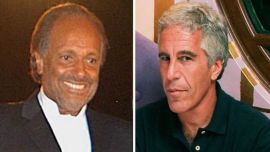The Brazil of far-right President Jair Bolsonaro is not always a welcoming place for women, gays and people of colour.
But a diverse group of Brazilian Olympians has seized the stage in Tokyo, claiming the most medals in the country's history – and winning hearts back home.
With the women's volleyball team's win Friday in the semi-finals, Brazil's Olympians guaranteed they would bring back at least 20 medals from Japan, besting the previous record of 19 medals the country snagged when it hosted the Rio Games in 2016.
The record-breaking haul comes courtesy of a group of Olympians as diverse as Brazil itself – including golds from black gymnast Rebeca Andrade, lesbian swimmer Ana Marcela Cunha and female sailors Martine Grael and Kahena Kunze.
"This medal is also the result of all the help we've gotten fighting for equal rights," said Cunha after winning gold in marathon swimming. "Women can be whatever we want, wherever we want and however we want."
Brazil's rainbow-coloured Olympic exploits come at a time when the country is in the midst of a conservative wave led by Bolsonaro, who regularly draws accusations of racism, misogyny and homophobia for his comments on blacks, women and gays.
The Inter-American Commission on Human Rights warned in April there has been an increase in hate crimes and hate speech in Brazil since Bolsonaro took office in 2019.
"These wins for women, blacks and LGBTQIA+ people helps bring visibility to other ways of living, which were oppressed, excluded and kept largely invisible until only recently in our history," said anthropologist Claudia Kessler of the Federal University of Rio Grande do Sul.
"Slavery, the forced internment of homosexuals in psychiatric hospitals and the absence of civil rights for women went on for centuries," she told AFP.
Women win big
Brazilian women have won more medals in Tokyo than ever before, with nine. Brazil, however, is not always an easy place for women to succeed.
Women earn on average just 76.5 percent as much as men, according to a 2018 study from the national statistics institute, which found "women study more, work more and earn less than men."
The sprawling country of 212 million people has a deep-rooted culture of machismo, and violence against women is rampant: Brazil recorded 1,350 femicides last year, 230,000 cases of domestic violence and nearly 14,000 rapes, according to the Brazilian Public Security Forum.
It has only been four decades since the repeal of a law that barred women in Brazil from playing sports deemed "incompatible with their nature," including football, boxing, rugby and weight-lifting.
Bolsonaro silent
Volleyball star Douglas Souza, one of the few openly gay men in Brazilian sports, has meanwhile conquered social media with his humorous posts offering a behind-the-scenes glimpse at the games.
"The power of sport and the visibility of the Olympics are reconfiguring the national conversation on minorities, on women, on gays, on blacks in Brazil," said sociologist Marcia Couto of the University of São Paulo. "These groups' triumphs help promote a necessary debate."
Bolsonaro has yet to congratulate any of Brazil's Olympians. They have also kept quiet on him, largely steering clear of politics. But many have not been shy in speaking out about their race, class and sexual identity.
"I want recognition," sprint canoeist Isaquias Queiroz wrote in newspaper Globo. "I want a black person from Bahia [the state with the largest Afro-Brazilian population] to be the biggest star in Brazil."
Brazil's population is 55 percent black or mixed-race. It was the last country in the Americas to abolish slavery, in 1888, and the United Nations warned last year that it remains an "extreme example" of structural racism.
Footballer Paulinho meanwhile made his statement on the pitch, celebrating a goal in Brazil's 4-2 win over Germany by striking a bow-and-arrow pose that symbolises Oxossi – an orixa, or Afro-Brazilian deity – which went viral in Brazil.
related news
by Rodrigo Almonacid, AFP























Comments